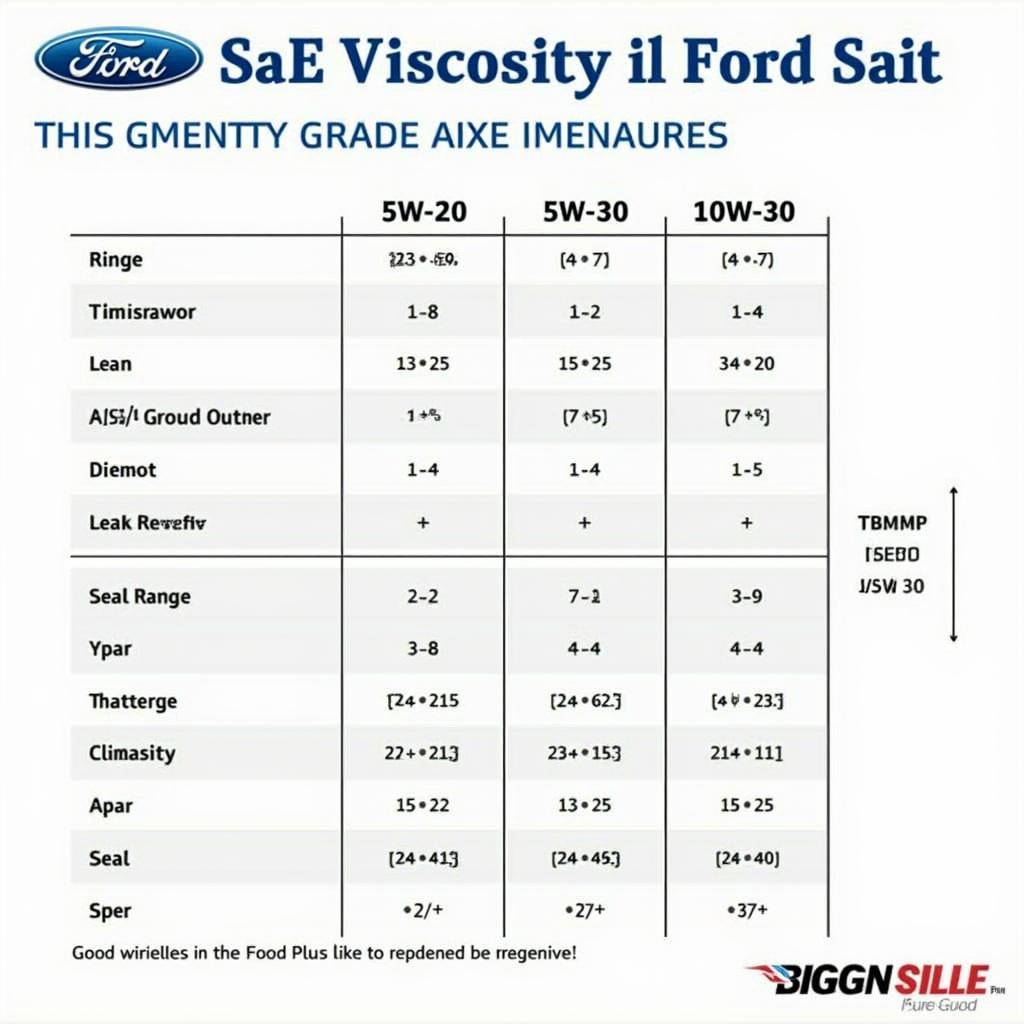Choosing the right engine oil for your Ford is crucial for maintaining its performance and longevity. Using the incorrect type can lead to decreased fuel efficiency, engine wear, and potentially costly repairs down the road. But with so many brands and varieties of engine oil on the market, it can be confusing to know which one is right for your Ford.
This comprehensive guide will walk you through everything you need to know about selecting the correct car service engine oil for your Ford. We’ll cover the importance of viscosity grades, oil specifications, and understanding the information on your owner’s manual.
Decoding the Labels: Understanding Engine Oil Viscosity Grades
One of the most important factors to consider when choosing engine oil is its viscosity, which refers to its thickness or resistance to flow. The Society of Automotive Engineers (SAE) has established a grading system for engine oil viscosity, denoted by a number.
You’ll typically find two numbers separated by a “W” on engine oil bottles. The first number, followed by the “W” (for “Winter”), indicates the oil’s viscosity at low temperatures. The lower the number, the better the oil flows in cold weather, ensuring easier starting and quicker lubrication.
The second number represents the oil’s viscosity at high temperatures. This number indicates how well the oil maintains its lubricating film under intense heat and pressure. Higher numbers indicate thicker oil that provides better protection at higher temperatures.
For most Ford vehicles, the recommended viscosity grade is 5W-20 or 5W-30. However, this can vary depending on factors like the engine type, climate, and driving conditions.
Meeting the Standards: Ford’s Engine Oil Specifications
Beyond viscosity, Ford has specific engine oil quality standards that ensure optimal performance and protect your engine from wear and tear. These standards are represented by a combination of letters and numbers, such as “Ford WSS-M2C946-A.”
It’s crucial to choose engine oils that explicitly state they meet Ford’s specifications. Using oils that haven’t been tested and approved by Ford can potentially void your warranty and even cause engine damage in the long run.
Your Owner’s Manual: The Ultimate Guide to Engine Oil for Your Ford
While this information serves as a general guideline, the best source for determining the ideal engine oil for your specific Ford model is your owner’s manual.
The manual will provide a comprehensive overview of the recommended viscosity grades, oil specifications, and any special considerations for your vehicle. It’s essential to follow these recommendations closely to ensure the best performance and protect your investment.
FAQs: Frequently Asked Questions About Ford Engine Oil
Q: Can I use synthetic oil in my Ford?
A: Yes, synthetic oils are generally compatible with Ford vehicles and often offer superior performance and protection compared to conventional oils.
Q: How often should I change my Ford’s engine oil?
A: Refer to your owner’s manual for specific oil change intervals. However, a general guideline is every 5,000 miles or six months for conventional oil and every 7,500 miles or twelve months for synthetic oil.
Q: What happens if I use the wrong engine oil in my Ford?
A: Using the wrong engine oil can result in reduced fuel efficiency, increased engine wear, and potential engine damage over time. It’s crucial to follow the manufacturer’s recommendations.
Need Assistance? We’re Here to Help!
Choosing the right engine oil for your Ford is a critical aspect of car maintenance. If you have any further questions or need expert advice, our team at CarServiceRemote is always available to assist you.
Contact us via WhatsApp at +1(641)206-8880 or email us at [email protected]. We offer 24/7 customer support to address all your car service needs.


